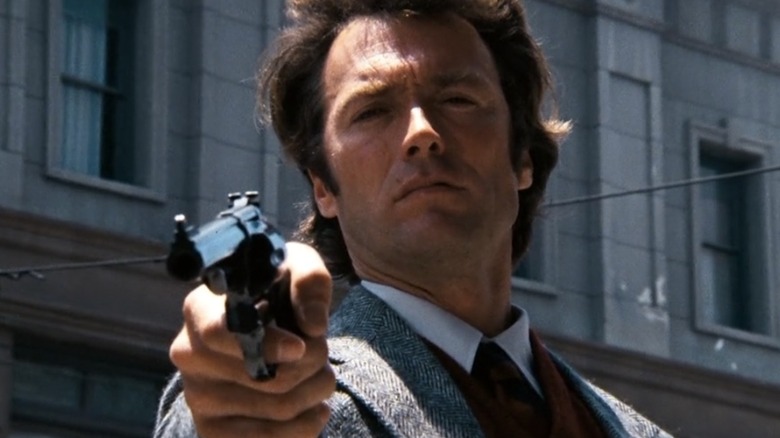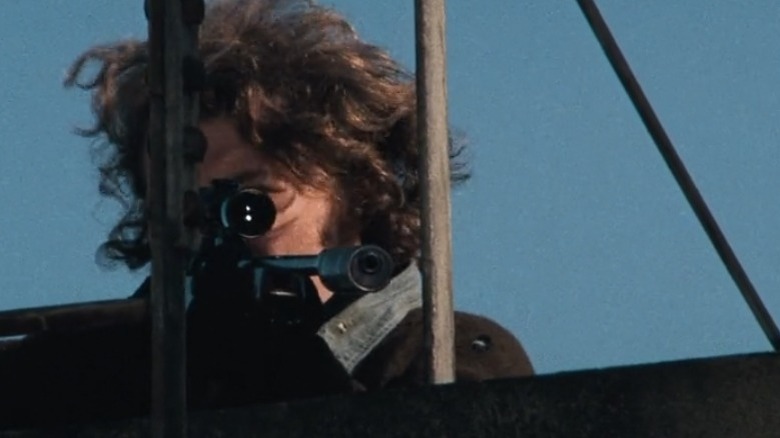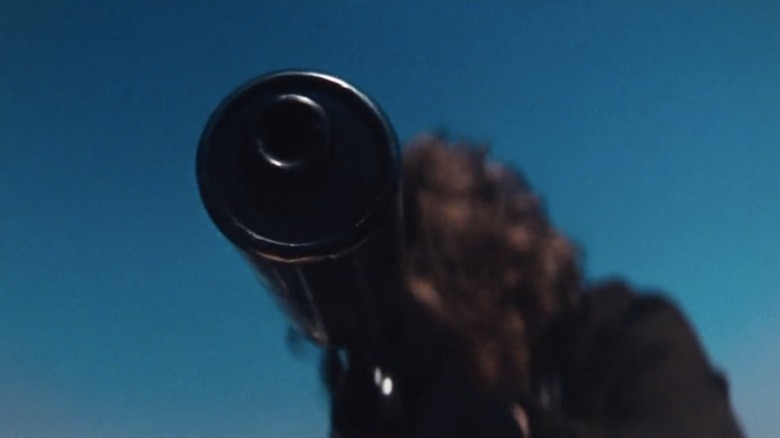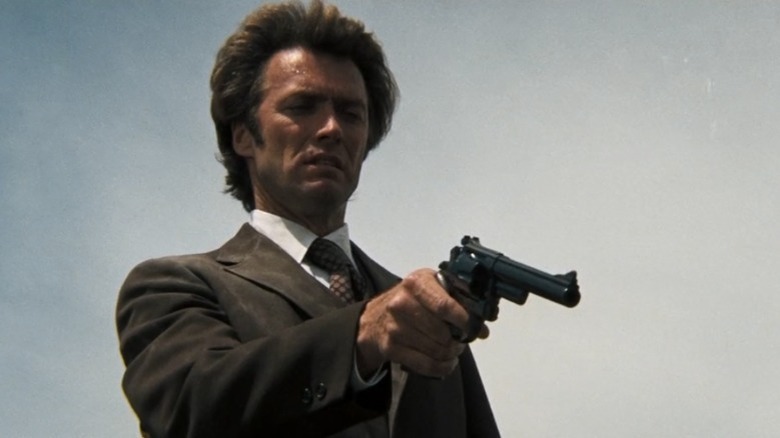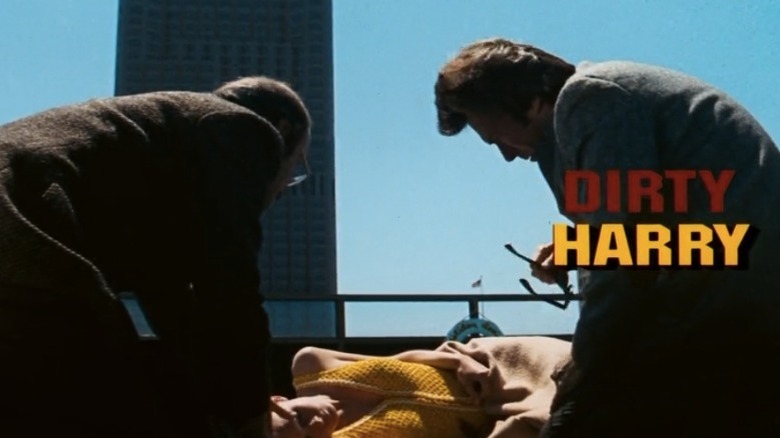The Dirty Harry Controversy Explained
As police brutality has once again become a powder-keg issue in recent years, depiction of police in films and TV is coming under the microscope as well. One of the most controversial cop figures in movie history is Clint Eastwood's iconic Harry Callahan in "Dirty Harry." There are many reasons they call him Dirty Harry, one being he does any "dirty job" that comes his way. It's a moniker that suits a character who doesn't mind getting messy with his morals. In the film, Callahan tracks down a sadistic criminal known as the Scorpio Killer, who shoots innocent people from rooftops. Callahan, to the chagrin of his department and the mayor, doesn't mind bending any legal and moral line he can to bring Scorpio to justice.
"Dirty Harry" proved provocative on many accounts when it first came out, with its frank depiction of "justice" delivered by its central character who has no qualms or second thoughts about pulling his gun out the moment he senses trouble. The iconic opening sequences sees Harry Callahan waltzing through the streets of San Francisco after a bank robbery, eating a hotdog and ready to pull the trigger on one of the criminals. Callahan is a clichéd archetype now — the hard-boiled cop who plays by his own rules — but was a political lightning rod for controversy upon the film's release. His influence is manifest in countless other such depictions of hardened cops not only in Hollywood movies, but in movies around the world, like Azuma in Takeshi Kitano's "Violent Cop" or Anant Walenkar in Govind Nihalani's "Ardh Satya." Callahan is representative of what people both love and loath about cinematic depictions of the police.
An Evergreen Controversy
When "Dirty Harry" first came out, there was an emphatic rebuke in some circles of Callahan and the film's general valorization of police. The Oscar ceremony that year saw protesters outside the venue holding placards reading 'Dirty Harry is a Rotten Pig.'
"Dirty Harry" doesn't exactly play it subtle with its love for law enforcement. The movie begins with a cloying montage dedicated to the fallen heroes of the San Francisco Police Department, a department which has a long history of racism that continues today. Racial profiling by the SFPD is openly acknowledged in the film during a meeting with the mayor where Callahan's superintendent mentions that the department deployed rooftop surveillance and helicopters in "the Black area" to track the killer.
Today, we're still seeing more couched racist rhetoric play out, whereby social justice is being equated with "coddling criminals." Fears of a "crime wave" in San Francisco have also resurfaced despite crime rates trending downwards for years. This is not so different from the fear-mongering tactics of the Nixon administration's "war on drugs" campaign, which launched just a year prior to the release of "Dirty Harry." The development of the film itself was a controversial matter, with both Burt Lancaster and Paul Newman rejecting the role of Callahan because they did not agree with the film's reactionary politics.
The Thin Line Between Good and Evil
Divided reactions in the press followed the film, with critic Pauline Kael calling it a confirmation of fascist ideals. Kael notes that the movie obscures the idea of justice by turning evil and crime into a metaphysical entity:
"in the movie, laws protecting the rights of the accused are seen not as remedies for the mistreatment of the poor by the police and the courts but as protection for evil abstracted from all social conditions."
Scorpio is presented as a soulless and remorseless entity with a willingness to kill anyone, even bury them alive, for no discernible reason other than ransom money. The first shot of him is blurred, indecipherable, and behind the barrel of an intimidating sleek, black rifle in a blue-sky backdrop. The movie makes a wager that Scorpio's nihilism would not only make Callahan, presented through Eastwood's silky voice and unfazed confidence, justified, but actively desired by audiences. When he presses his leg on Scorpio's wound causing him severe pain, the film presses us into a moral conundrum. Callahan's brutality and bending of the law aims to enforce a vague form of justice that equates to vengeance. When he is reprimanded for abusing Scorpio, he mockingly comments "Oh, I'm all broken up over that man's rights." Callahan's brutality becomes an asset for our emotional catharsis — our very American need for revenge.
We Love Our Anti-Heroes
When we consider modern discourse of police brutality, a lot of it is still stuck in questions of whether the perpetrator "deserves it." It's always framed for us to justify the use of power for the good of safety. In the case of George Floyd or Eric Garner, people bent over backwards to unveil their minor offenses to make them look like criminals who don't deserve sympathy. We, as audiences, do this all the time when justifying anti-heroes like Harry Callahan to ourselves.
Eastwood plays Callahan as cool, collected and a handsome stoic face that buoys his gritty demeanor with an assuring self-confidence. He speaks in small sentences and every time something goes wrong, we still feel like he has control of things. The intoxicating nature of "Dirty Harry" and its central character could come from his individualism and his irreverence towards the power structures that hold him back. When Callahan is reprimanded by the district attorney who tells him how his negligence of Miranda Rights wrecked the case against Scorpio, Callahan says "Then the law is crazy." The tail end of the Nixon Administration, the Watergate scandal, the Vietnam War — the '70s saw an era of cinema dedicated to paranoid thrillers actively questioning power. Today, we are again in an era of disillusionment with the state. There's something intoxicating, whether we like it or not, about a "hero" who can cut through it all.
Why We Love and Hate Harry
Roger Ebert explained in his review of "Dirty Harry" that while the movie certainly embodies reactionary politics, it justifies itself because it reflects people and things that are real about our society and should not be ignored:
"I think films are more often a mirror of society than an agent of change, and that when we blame the movies for the evils around us we are getting things backward. "Dirty Harry" is very effective at the level of a thriller. At another level, it uses the most potent star presence in American movies – Clint Eastwood – to lay things on the line. If there aren't mentalities like Dirty Harry's at loose in the land, then the movie is irrelevant. If there are, we should not blame the bearer of the bad news."
The love for the iconic Harry Callahan and "Dirty Harry" stands the test of time because it presents us with a fantasy. Some of what the film depicts is true and terrible — police torturing victims and targeting Black communities — but most of it is idealized. Its tan and blue sheen, its shadows and ominous lighting, present San Francisco as a city slowly descending into darkness and only one man can save it. Callahan rebels against the powers of authority in a way we wish we could. His last act is to rip his badge off and toss it into the water — a total rebuke of the system. We may wince at Callahan's idea of what "justice" is, but living in America, that feeling of ripping the badge off and walking away is universal.
